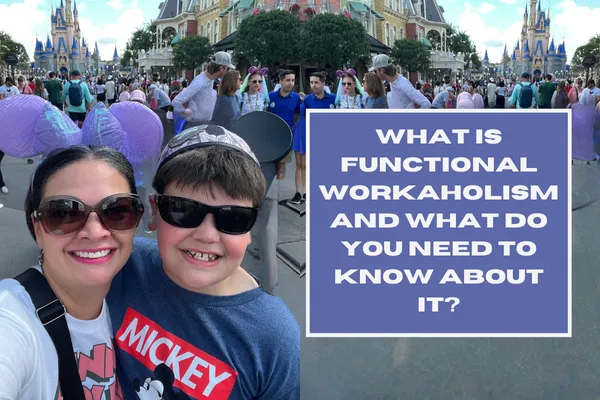Harness the Power of Exceptional Leadership

The Untold Stories About Work as an Addiction: What Is Functional Workaholism and What Do You Need to Know About It
I bet you whatever you want that there is a functional workaholic in your life. It could either be you or someone that you care about.
Yet functional workaholism and its effects are topics that are being dismissed left and right in our society today.
In part, this is due to the lack of awareness about the topic, but it is also because, let's be honest: who really wants to claim the badge of honor that comes with such a title?
Well, guess what? I am! I am claiming the badge with honor and I'm happy to carry the stigma that might come with it, because someone (me in this case) needs to talk about this issue.
So, here we go: Hi, my name is Carmen and I'm a recovering workaholic who wants you to be aware that despite the societal applause for "hard workers," the truth about work addiction is seldom discussed.
That's why I'm inviting you to explore with me the world of functional workaholism, to uncover its hidden impacts, and explore what you can do about it.
But... How should you know if "this" is for you?
I figured you would be tempted to excuse yourself from the conversation, but before you do that, I'm asking you for a minute, because if you (or someone that you care about) are someone who always stays plugged into work (yes, even on vacation), or if you know someone who can't seem to step away from their desk, you have to read this.
I'm writing this for you, especially if you are a leader who wouldn't know what to do with themselves without emails, or an entrepreneur who thinks weekends are just another opportunity to work, and definitely for those of you who are always the last to leave the office (even if you are unintentionally putting off your life).
The sad reality of our culture is that we often equate success with hard work. But there's a fine line between dedication and addiction. A line that's often not discussed, not publicly at least.
Today, I'm pulling back the curtain on the glorification of workaholism to reveal the risks it hides.
Why?
Because understanding functional workaholism is the first step towards creating a healthier work-life balance for yourself and so that we together can influence others to do the same.

What is Functional Workaholism and Its Dark Turn
Functional workaholism might disguise itself as success, but true progress knows when to pause. - Carmen Paredes
When I understood that functional workaholism might disguise itself as success, but true progress knows when to pause, it was as is someone has literally switched on a light bulb in the dark room (reality) I was living in.
Functional workaholism describes a scenario where you're addicted to your work but you still function well —I mean, you are meeting and even exceeding job expectations, and because of that, you don't even suspect something so damaging is building up inside of you.
The success that comes with functional workaholism often masks the personal costs: deteriorating health, weakening (and even destroying) relationships, and a decline in overall happiness.
The truth is that externally everything looks perfect, but internally, the struggle is real - whether or not you are aware of it.
But, when the scale tips and the negative aspects outweigh the ability to function effectively, functional workaholism becomes dysfunctional workaholism. In other words, you can't control it anymore... it controls you!
This transition from functional workaholism to dysfunctional workaholism happens as the your body gets used to the "reward" also known as dopamine, that you reach and unsuitable needed level to feel something. All this while stress and constant overworking lead to severe mental and physical health issues, significant relationship breakdowns, and ultimately, a decrease in work performance.
Workaholism: History and Facts
Did I made the term workaholism up?
I wish, but the fact is that the term "workaholism" was first coined by psychologist Wayne Oates in 1971. In his seminal book, "Confessions of a Workaholic," Oates describes workaholism as the compulsive and uncontrollable need to work incessantly. This compulsiveness is what differentiates a hard worker from a workaholic.
According to a study by Harvard Business School, "Workaholics characterized by compulsion to work are more likely to suffer from deep-seated psychological problems such as anxiety, depression, and emotional instability." The study further highlights that 30% of high achievers may suffer from these severe stress-related conditions because of their work habits.
30% of high achievers may suffer from these severe stress-related conditions because of their work habits.
A Personal Reflection: My Life Then and My Life Now
I’m actually writing this story from Disney World, but don’t worry... I’m not relapsing into my work addiction. In fact, I didn't check a single email, respond to a single business text, or even think about work for the entire 12 hours we were at the Magic Kingdom today, I'm actually extremely proud of myself, not only because I spent the most amazing day with my son Hank while I was fully present the entire time, but because I got to enjoy Disney World like I haven't before. But sadly life was very different just a few years back.
The last time I was here with my children, I took every opportunity I got to work: Long lines? Perfect—I could knock out some emails. Meetings and presentations while on vacation? Of course! I’d arrange my schedule—and my family’s—to make sure I wouldn’t disappoint those who expected me to work around the clock. And, did I charge extra because I was working when I wasn’t supposed to? Of course not! Working was the familiar routine that made me happy; it was my dopamine!
Working was the familiar routine that made me happy; it was my dopamine! - Carmen Paredes
It all seemed great until I burned out so badly that I almost died. I found myself having to quit everything to give my kids the chance to have a mother. That’s why now I treasure my life and the times with my kids like there is no tomorrow. And, because I’m aware of my addiction to work and the fact that I can’t consider myself "functional workaholic" anymore, I have learned to prevent potential opportunities for relapse.

How Can You Recognize the Signs of Workaholism for You or Your Loved Ones?
Whenever you add the word functional to a bad a thing it means it's socially accepted, in other words it's going to be difficult to recognize you are in sticky soil, but the following hints will help you assess whether or not you are experiencing workaholic habits or are at risk.
Inability to Disconnect: You find yourself constantly checking emails and calls during all hours, unable to truly relax. - Even on Vacation!
Chronic Work-Related Stress: You suffer from ongoing stress, anxiety, and physical symptoms like headaches, which are primarily due to work.
Neglected Personal Life: You often miss out on personal activities and family events because of work, even if you are there physically.
Self-Worth Dependent on Work: Your sense of value is tightly linked to your productivity and work achievements.
What can you do to begin breaking those workaholic habits?
The first thing you need to do in order to break any habit is the complete awareness the habit exists within you.
An assessment is usually a great way to start, and that's why I invite you to take this Free Workaholism Quizlet from my website. This tool will help you see just how much your work habits influence your life and start identifying what needs to change.
If you realize that you are indeed at risk of developing workaholic habits -or- perhaps you have already... I got you, and I mean it, because as a receiving workaholic myself I have to figure out how to pull myself out of the pit.
Life after Workaholism
I know that realizing that something has the power to control you could feel devastating, especially if you are a type A, high achiever like me, and trust me when I say that none of this mean that you can't continue to be a high achiever. What it means is that you have to consciously make changes in and around the way you work to avoid extreme and irreparable impacts to the rest of your life.
After you have assess your situation, the most important steps you can take to recovery, are to explore what's the thing you are subconsciously numbing with work, to learn to manage your EQ and consciously plan to avoid relapse.
I invite you to contemplate on this question: Have you or someone you know ever missed important life moments because of work? If so, it's never too late to reclaim your life!
Post your stories and questions below. Let’s encourage a dialogue that values personal well-being as much as professional success.


